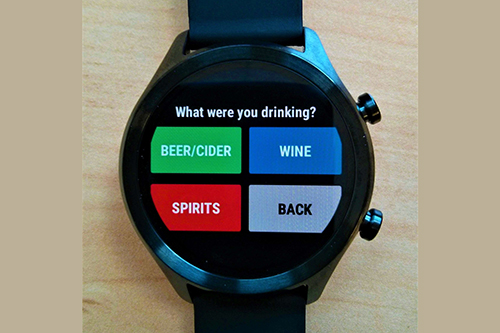This study (‘AlcoWatch’) is the first to use recently developed smartwatch-based methods (referred to as micro Ecological Momentary Assessment) to capture detailed, self-reported data about alcohol consumption over a long period of time. The results are published in JMIR Formative Research.
Currently, the most established method to record a person’s daily drinking is an online diary-based method known as Timeline Followback (TLFB). However, this method has a number of issues, including the user not being able to remember correctly the details of the alcoholic drinks consumed when asked a few days or weeks later.
The aim of this study was to investigate; the feasibility of using the new smartwatch based methods to capture data about alcohol use, the acceptability of these new methods to different socio-economic groups, and if levels of engagement with these new methods were better than TLFB.
Thirty-two participants from Bristol’s Children of the 90s health study wore standard, off the shelf Android smartwatches, on which the custom-developed ‘AlcoWatch’ data capture application was running. Over 12 weeks, participants were asked 5 times a day about any alcoholic drinks they had drunk in the previous two hours, where they were consumed, and if they were alone or with other people.
As a comparison, participants also completed fortnightly online diaries of alcohol drunk using TLFB. At the end of the study participants completed a semi-structured interview about their experiences.
The research found that participants had higher levels of engagement using ‘AlcoWatch’ than TLFB.
One of the important benefits of higher engagement is that is reduces the level of missing data, which makes the findings of any analyses of drinking behaviours more robust. The researchers also noticed lower levels of engagement amongst lower socioeconomic participants compared to those in the higher socioeconomic group.
In summary, the research team found the ‘AlcoWatch’ smartwatch -based system is a feasible method for capturing data about alcohol consumption. It was well accepted by participants, and is particularly suitable for capturing data about people’s alcohol drinking behaviours in real world settings as they go about their everyday lives. It will allow researchers to investigate patterns of drinking over both short and long periods of time, in greater detail than is currently possible.
Chris Stone, Senior Research Associate in Wearable Technology Application Development in Bristol’s Tobacco and Alcohol Research Group, and Integrative Cancer Epidemiology Programme (ICEP), said: “Our study demonstrates that smartwatches have considerable potential for capturing data about alcohol drinking behaviour in people’s real-life environments.”
Dr Andy Skinner, Senior Research Fellow and Digital Projects Lead in the Integrative Cancer Epidemiology Programme at the University of Bristol put the new findings in the context of their wider work, added: “We recently demonstrated the usefulness of smartwatches for capturing data about smoking behaviours with ‘StopWatch’ — our smartwatch-based based smoking cessation intervention.
“This new study builds on that previous work, demonstrating that smartwatch-based methods for data capture could help researchers explore a much wider range of health-related behaviours, and develop new interventions to help with important issues like problematic drinking.”
The research team recommend future studies should explore reasons for reduced engagement by participants; how comfortable the smartwatches and other wearables devices used are to wear, and the battery life of the devices and how often they need charging.
Further investigation should also be carried out into why engagement differed between high and low socio-economic participants, and the causes for the differences.
The research was funded by an UKRI Innovation Fellowship award to Dr Andy Skinner, and was carried out within the Cancer Research UK-funded Integrative Cancer Epidemiology Programme (ICEP), and the MRC Integrative Epidemiology Unit (MRC IEU). It was a sub-study of Children of the 90s, also known as the Avon Longitudinal Study of Parents and Children (ALSPAC), a longitudinal cohort study funded by the Medical Research Council (MRC), Wellcome and the University of Bristol.
Paper
‘Smartwatch-based ecological momentary assessment for high temporal density longitudinal measurement of alcohol use (‘AlcoWatch’): a feasibility evaluation’ by Chris Stone, Sally Adams, Robyn E Wootton, Andy Skinner in JMIR Formative Research
